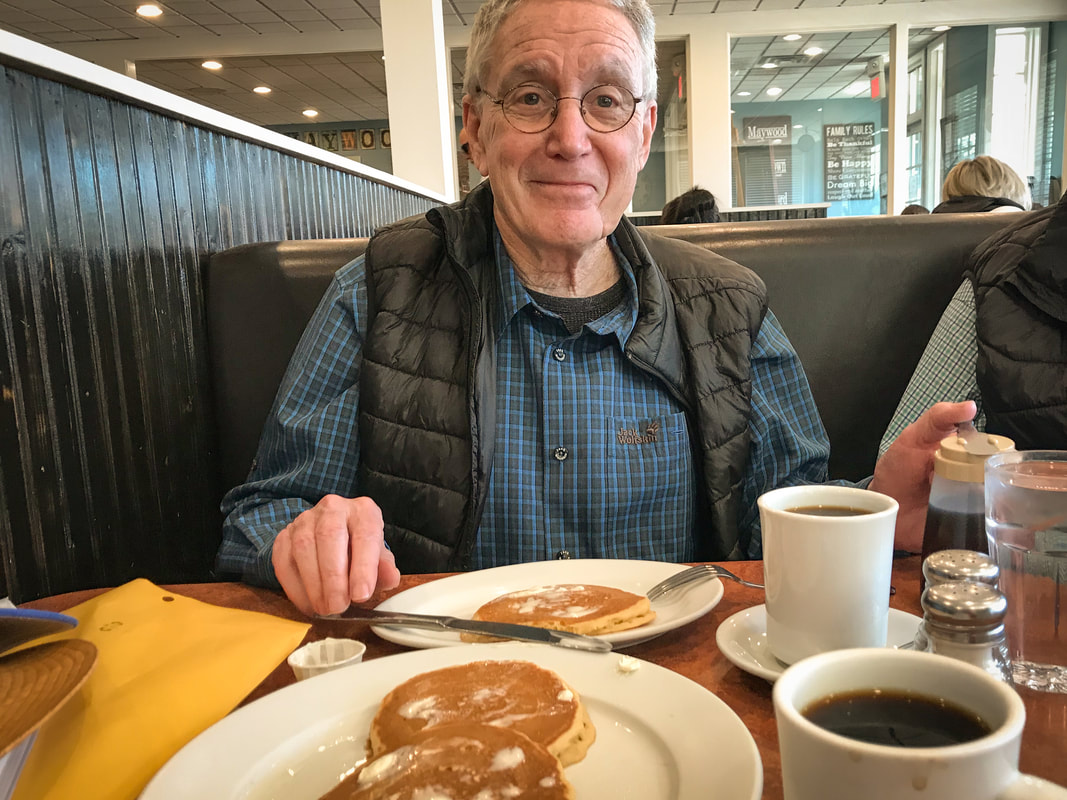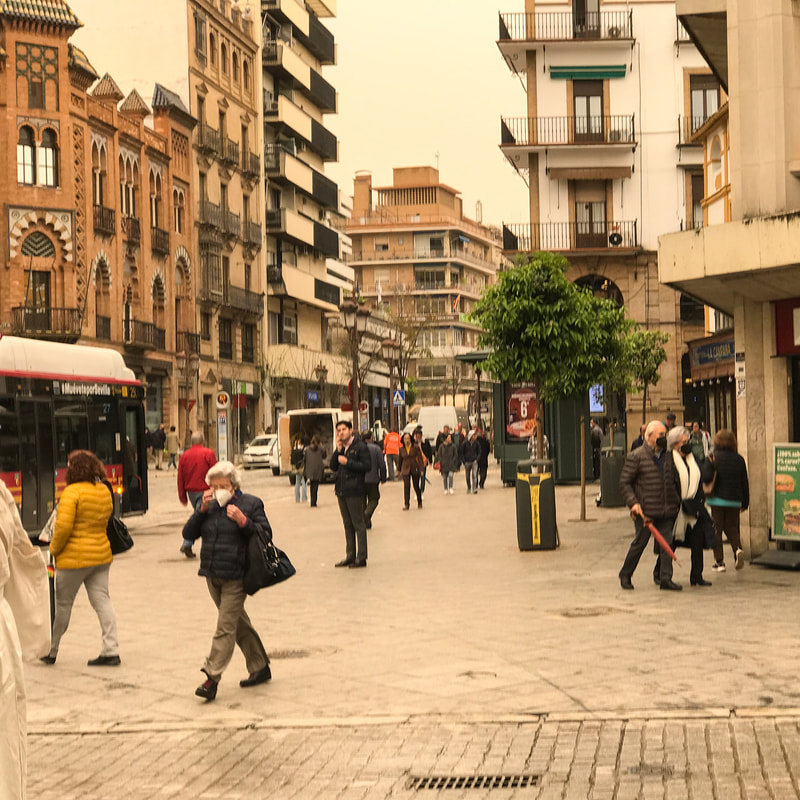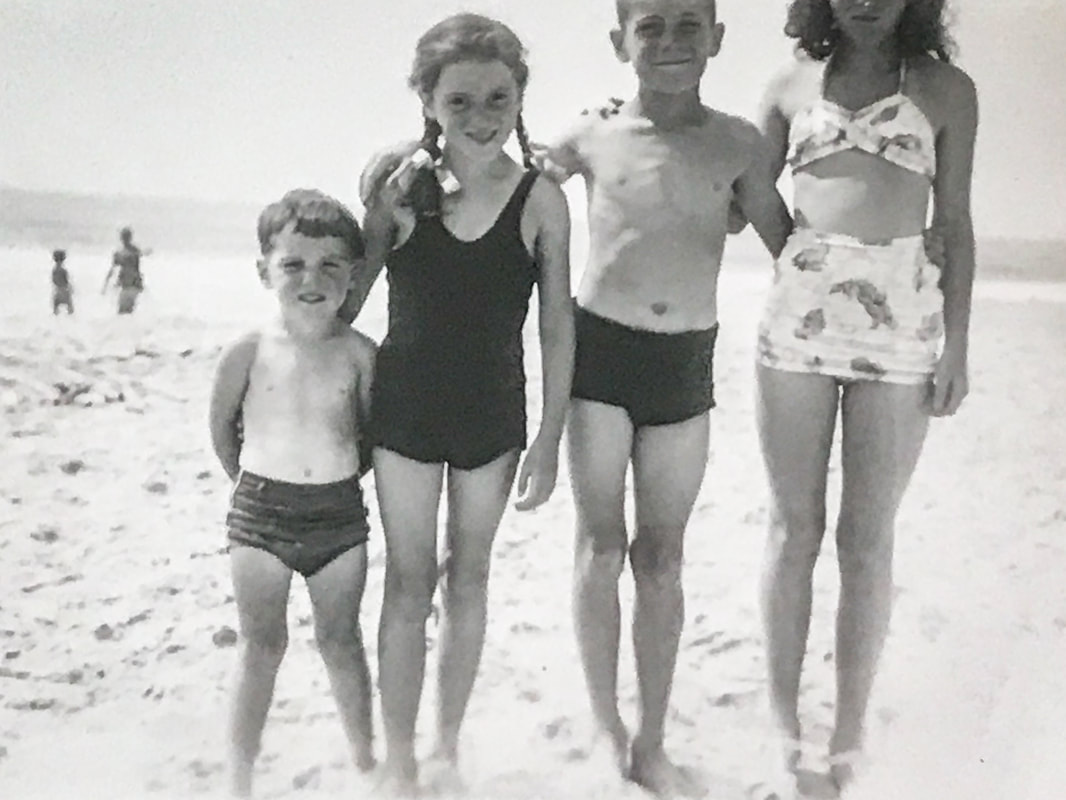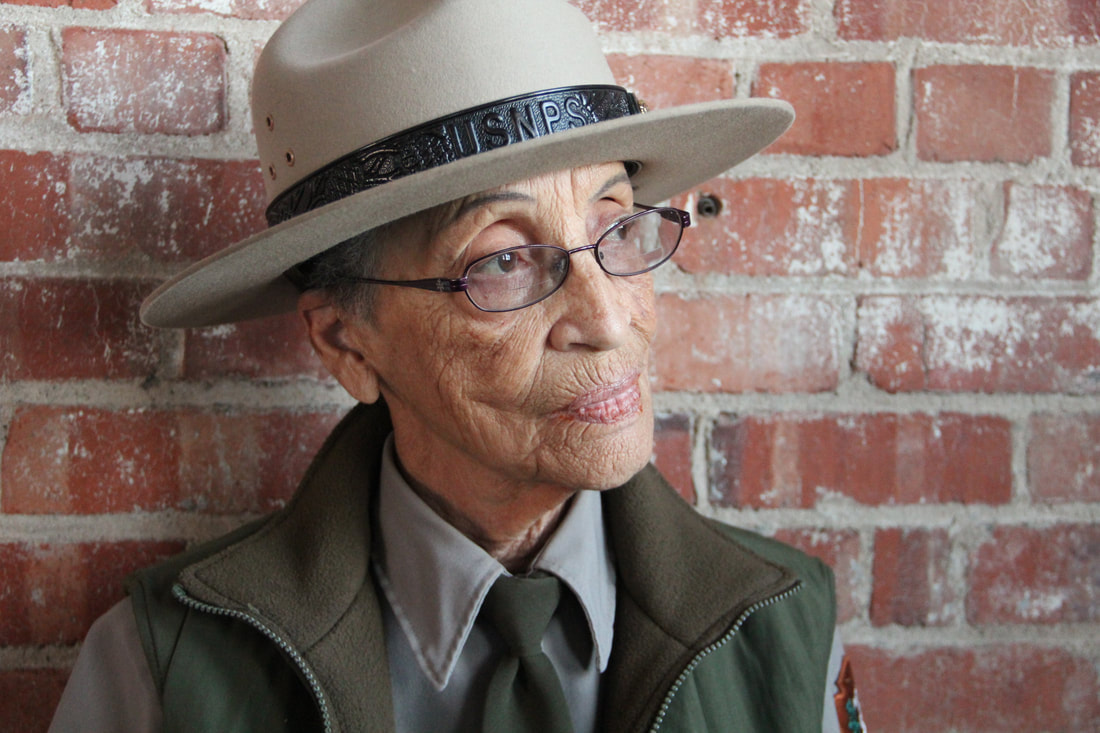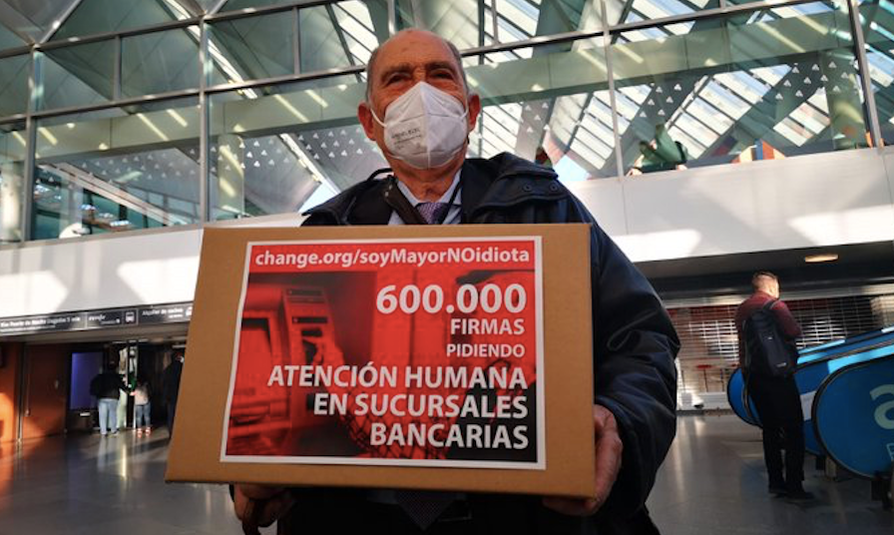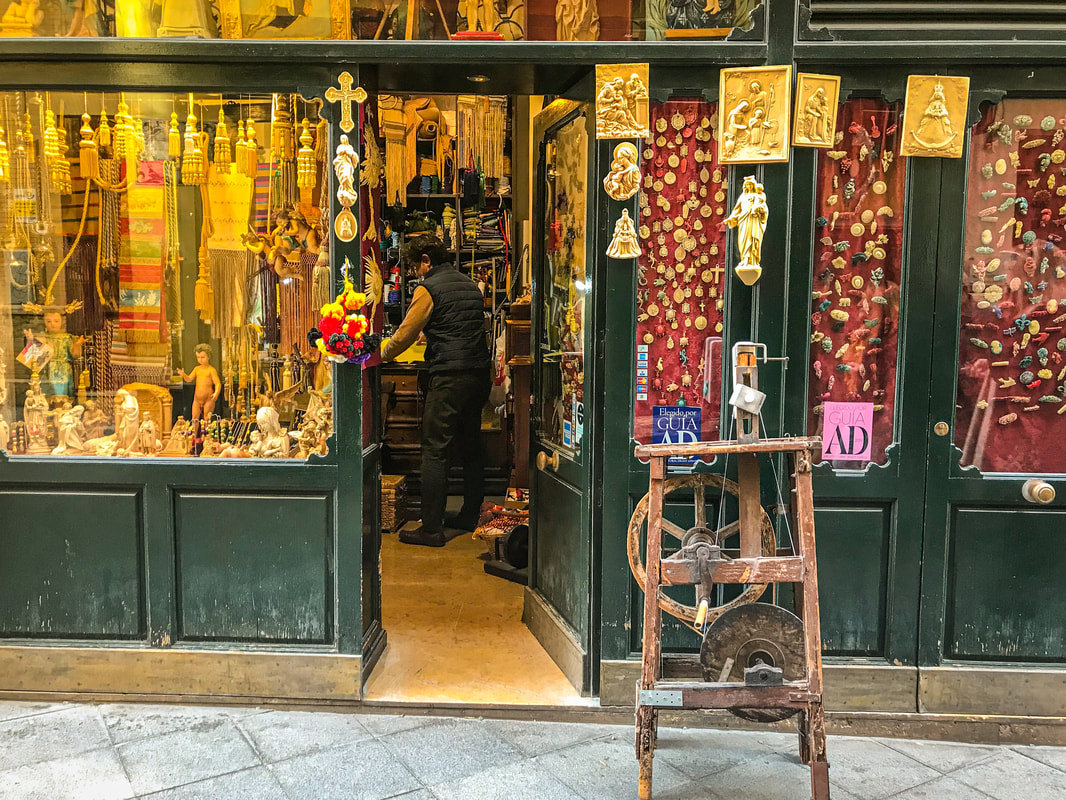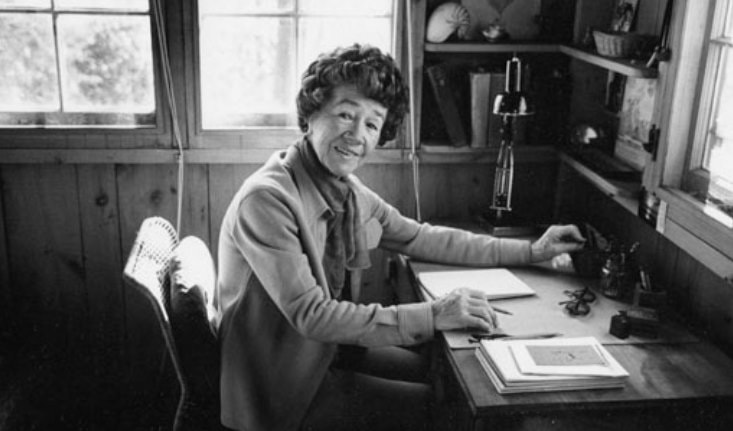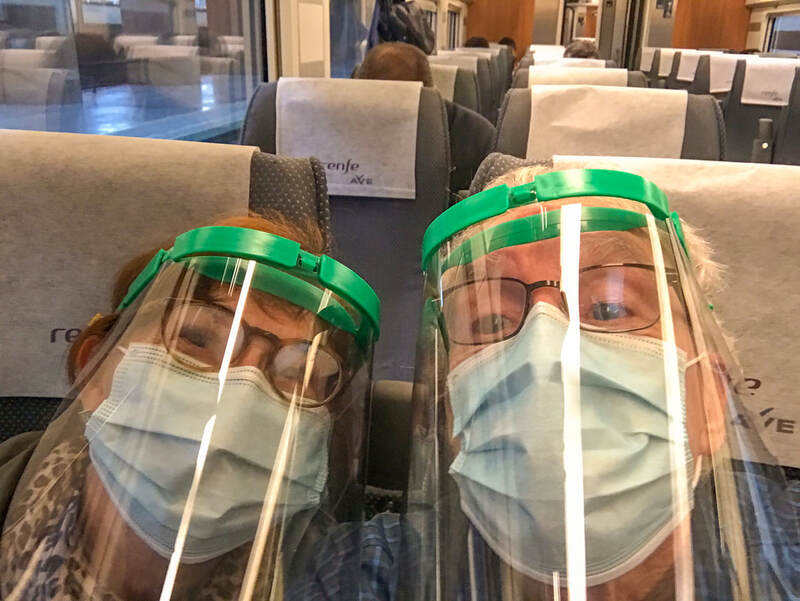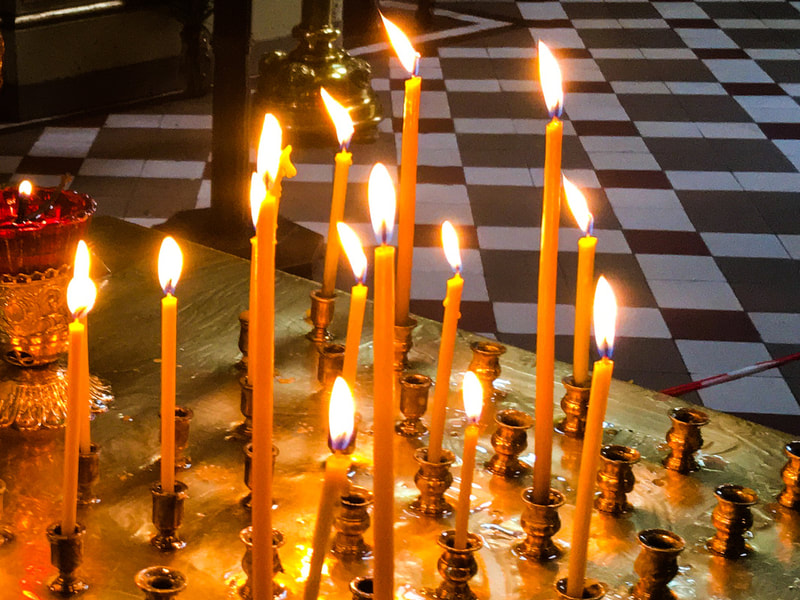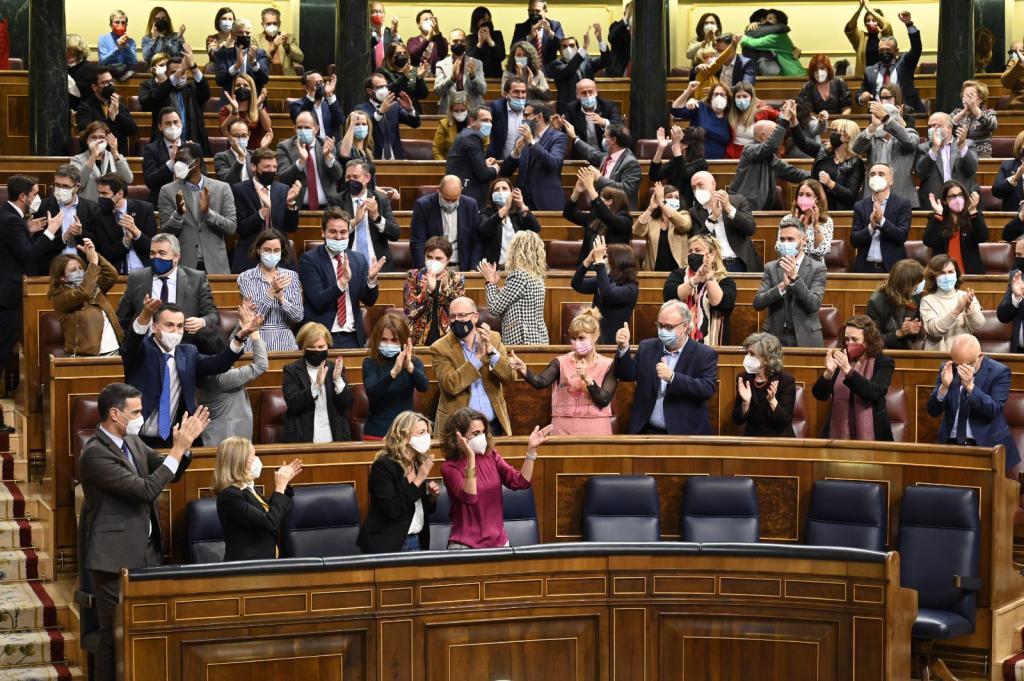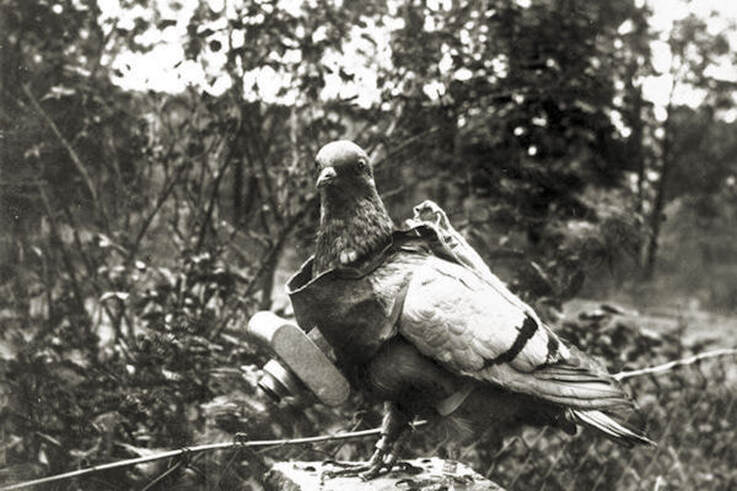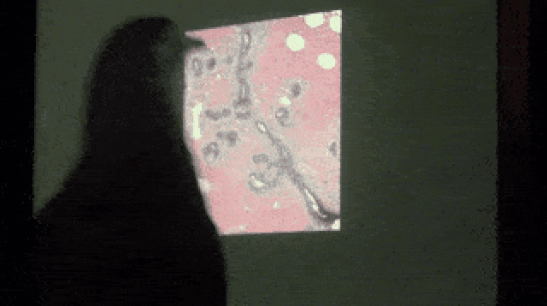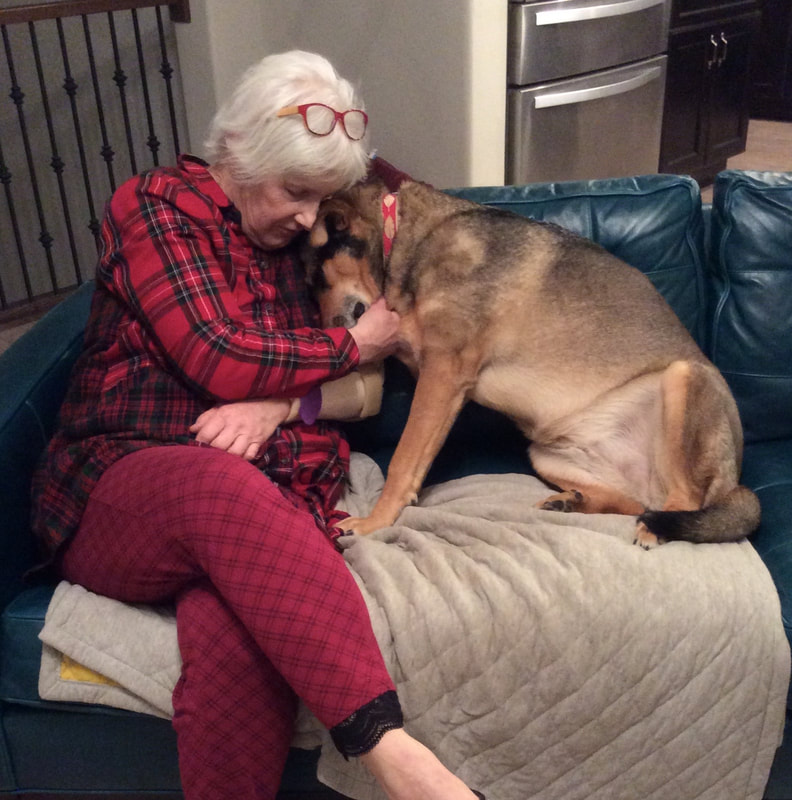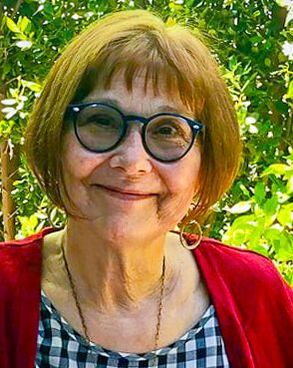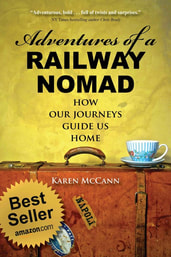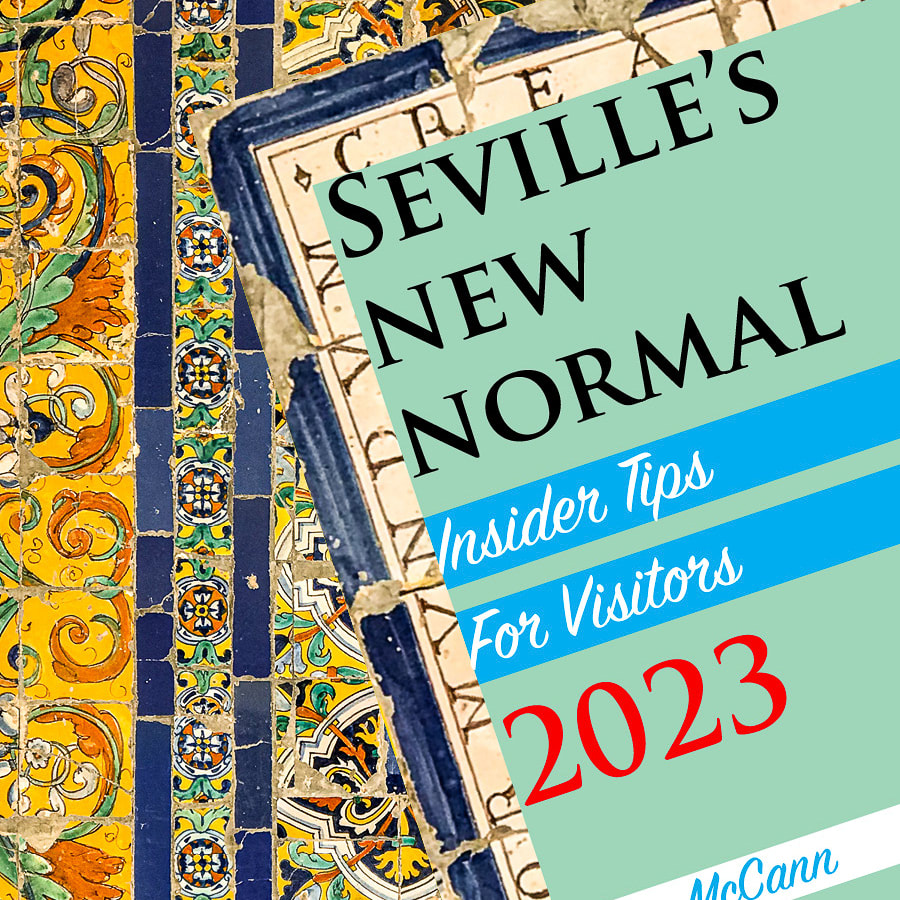|
Just before leaving Seville, I awoke to find the sky yellow and the city coated with muddy sand blowing up from the Sahara desert. Spain was in the grip of a sirocco, the gritty wind that can last weeks and is said to make everyone irritable and drive some to madness and mayhem. In olden times, if you murdered someone during a sirocco, you’d plead for a lesser sentence due to extenuating circumstances. So far I hadn’t noticed any homicidal impulses in Rich or myself but made a mental note to be on the alert. Online, the air quality was listed as HORRIBLE in bold red caps, followed by hair-raising warnings about dangers to your nose and lungs. I made another mental note to avoid breathing, especially outdoors. Not to keep you in suspense, Rich and I managed to finish packing, walk to the train station, and arrive in Madrid without killing each other or anyone else. Whew! I didn’t even feel unusually irritated, although the same cannot be said of my respiratory system; I spent the entire flight from Madrid to JFK sneezing, coughing, and blowing my nose. As you can imagine, this was delightful for our fellow passengers and the crew, and I think it’s a tremendous credit to all of them that I wasn’t fitted with a parachute and shoved out over the Atlantic. We spent the next few days with Rich’s family in New Jersey and Connecticut, mostly telling old stories. Like the one about Rich’s sister Jane, who somewhere around third grade made an ill-advised foray into forgery. Apparently she’d gotten a poor mark on an assignment, and the teacher told her to take it home and get a parent’s signature to prove they’d seen it. Instead, Jane craftily signed it herself — only she signed it “Mother.” In crayon. Her crime was instantly detected, and after the ensuing uproar, the story became enshrined in family lore. The nostalgia train rolled on into my first-ever visit to Rich’s hometown: Maywood, New Jersey. To my absolute astonishment, it was exactly as I’d pictured it. Built just after WWII, the modest homes were within easy walking distance of the school, the shops, and the railway station where Rich’s father caught a commuter train into New York City seven miles away. When that train line was discontinued in the 1970s, the awkwardness of the commute kept Maywood isolated and preserved as if in a time warp. Over breakfast at Maywood’s Pancake House, his brother gave Rich a fat envelope. Inside we found family photos, a lock of Rich’s baby hair, and a letter Rich sent home while serving in Vietnam, the kind you write just in case. That letter took my breath away and made me count my blessings. Speaking of near-death experiences, a few days later we were in Tucson, Arizona having a close encounter with a snake. We'd been hiking in the Sonoran desert for over an hour, and despite signs warning us to watch for rattlers, Gila monsters, and other wildlife, so far all we’d seen was a small gecko. Then a six-foot snake slid across the path right in front of us, so close Rich would have stepped on it if I hadn’t grabbed his arm. “Saved your life,” I told him. “Possibly the snake’s, too.” “Wasn’t that just a big gartersnake?” he said skeptically. Later, one of the friends we were visiting asked, “What color was it?” “Black with a yellow stripe.” “There’s a saying about the snakes around here: ‘Black and yellow is a dangerous fellow.’ It was probably quite poisonous.” Yikes! Maybe I really had saved Rich’s life. On the other hand, looking at online photos later, I noticed the one most resembling ours had a caption reading, “Gartersnake. Harmless.” So who knows? As we got ready to leave Arizona, temperatures were soaring towards the 90s, scorching the landscape. Our friends had rented a condo in a gated community for retirees, hundreds of identical, low, adobe-style bungalows the color of sand: as near invisible as housing can get. My theory is the residents figure this way when their time’s up, the Angel of Death won’t be able to find them. I realize I’m not the first to say this, but arriving in San Francisco was like landing on a different planet. We walked off the plane into the colorful new terminal named for Harvey Milk, the first openly gay elected official in California. Back when Milk moved from New York to San Francisco in 1972, LGBTQ sex was criminalized in most of the country and under attack from anti-gay-rights activists. “If homosexuals are allowed their civil rights, then so would prostitutes or thieves or anyone else,” said Anita Bryant. A smart, funny guy with a genius for organization, Milk mobilized his Castro Street neighbors, then Americans everywhere. “If you are not personally free to be yourself in that most important of all human activities... the expression of love... then life itself loses its meaning,” he said. “All men are created equal. No matter how hard they try, they can never erase those words. That is what America is about.” Ten months after being elected city supervisor, Milk was assassinated by disgruntled ex-supervisor Dan White. As the city mourned, White claimed diminished capacity due to depression involving binging on sugary junk food, famously known as the “Twinkie defense.” Milk remains a national hero. In 2009 he was awarded the Presidential Medal of Freedom, and today his name appears on public buildings, schools, parks, a US Navy ship, and now an airport terminal. Time called him one of the “100 most important people of the 20th century.” Would Milk have achieved as much elsewhere? "The great thing about the Bay Area is that people don't accept the status quo here," says SF Chronicle editor John Diaz. Betty Soskin, now a lively 100, recalls how her boss built WWII Liberty Ships on high-speed assembly lines, hiring people of all colors to work together as never before in this country. “They accelerated the rate of social change, so that to this day it still radiates out of the Bay Area into the rest of the nation. It’s where the visionaries come to find constituents for their wildest dreams.” San Franciscans are often said to live in a bubble, but I believe it’s actually an incubator for hatching the next generation of change. Our anything-goes incubator culture enabled Levi Strauss to create blue jeans, Steve Jobs to develop personal computers, and Harvey Milk to dream of freedoms that are now a reality. And there are countless others. We don’t always get it right (see my previous remarks about the Twinkie defense, which semi-worked) but we keep trying. It’s fun to be back in my home state, where Rich and I will stay until the end of summer. We’re busy prepping for fire season, restocking our earthquake emergency kits and the Apocalypse Chow food locker, and trying to keep the garden alive during the worst drought in 1200 years. I’m bracing myself for whatever comes to this catastrophe-prone state. So far, California's never had a sirocco, but with today’s changing climate, who knows? Stay tuned for updates. YOU MIGHT ALSO ENJOY
17 Comments
“I saw a bank that said ‘24-Hour Banking,’ but I don’t have that much time,” comedian Steven Wright once joked. Ha! To hardened veterans of the Spanish banking system like us, 24 hours sounds laughably swift. Rich and I have been trying to untangle an issue with our Seville bank for over a year, and last week was our final showdown. The trouble started in January of 2021, when Rich and I were in the US and our residency cards were on the verge of expiring. Knowing this would cause our Spanish bank to freeze our account, we transferred all our money to an international bank, leaving 10€ in our checking account, and somehow just a single centimo (one cent) in savings. Last week, thinking we ought to tidy up our affairs by closing those frozen accounts for good, we made the 45-minute trek to the only local branch of our bank. There I explained that if they’d give us ten euros, we’d sign the closing papers and be on our way. The clerk looked at me as if I’d asked him to hand over his wristwatch — or possibly his firstborn child — to settle the account. “Cash? We don’t handle cash. Transfer only.” No cash? In a bank? Apparently it all happens online now. Don’t get me started. Unfortunately we didn’t have our international bank’s transfer details handy, and a sort of discreet pandemonium ensued. After fifteen minutes of furious keyboard activity, the clerk announced he could transfer the money to UNICEF. Fine with us! I naively supposed the charity would also wind up receiving the savings account’s final penny, but no. The clerk explained in order to do that we would, inexplicably, have to reopen our account, a process which would involve a second visit to the bank within 48 hours. At the look of horror on my face, he took pity and offered this wise advice: “Just walk away.” And so we did, leaving our penny behind to fend for itself. I love nearly all aspects of living in Seville, but I have to admit I’m glad to be done with the Spanish banking system. Rich and I will soon be heading to the US for the rest of the spring and summer, and as always in the run-up to departure, we’re reminding ourselves of the petty annoyances we’ll be happy to leave behind. These include line-dried towels that are stiff as boards no matter how much fabric softener I lavish on them; having to huddle over space heaters on chilly nights (yes, we get them here!); and the endless dust that comes from living in an old building in an ancient city filled with new construction projects. Seville is in a flurry of preparations for the floods of visitors expected soon for the spring festivals, Holy Week and Feria. Paint cans, tarps, and tools litter the sidewalks as hopeful owners spruce up store fronts, restaurants, and hotels, restoring them to their pre-pandemic glory. The atmosphere is one of cheerful bustle, and I often hear workmen singing as they push carts filled with beer barrels and grocery deliveries through the streets. In the midst of all this normality, it’s hard to believe that just 2500 miles away, another European country is at war with Russia. Sevillanos have been holding demonstrations of solidarity, chanting “Ucrania es Europa”(Ukraine is Europe). Measures large and small are being taken to poke the Russian bear in the nose. Zara’s parent company, Inditex, closed 502 Russian stores. Spain’s Royal Opera House canceled the Bolshoi Ballet. The Mobile World Congress in Barcelona dropped the Russian pavilion. I expect any day now to hear that the Spanish are changing the name of Ensalada Rusa (the potato-based, mayonnaise-laden Russian Salad) to Ukrainian Freedom Potatoes. A few nights ago over dinner, a friend asked if I thought nuclear war was coming. No, I don’t (touch wood!). But it’s certainly less absolutely inconceivable than it was a month ago, and that’s making everyone justifiably jittery. Fortunately for my ability to sleep at night, military experts are saying it’s highly unlikely that nukes will be deployed. More selfishly, I’m reassured by the fact that Seville is 2500 miles away from the action. Rich and I don't feel any immediate need to brush up on the duck-and-cover skills we learned as kids, although I do find myself eyeing my Ikea desk and wondering how it would hold up in a bomb blast. Let’s hope we never have to put it to the test. This week I’d originally planned to write a lighthearted post about International Happiness Day, which is coming up March 20. But right now that doesn’t seem to strike the right note. I’m reminded of the words of Anne Morrow Lindbergh, a woman who knew more than most about life’s joys and sorrows. “Don't wish me happiness,” she said. “I don't expect to be happy; it's gotten beyond that, somehow. Wish me courage and strength and a sense of humor — I will need them all.” And so will every one of us in the days ahead. But if we’ve learned anything in the last two years, it’s that we can cope with challenges that five minutes ago were unthinkable. In other news, Rich and I depart for the US a week from Thursday. No, we are not fleeing Europe one step ahead of the Red Army; our tickets were purchased weeks before the invasion of Ukraine. As my regular readers know, Rich and I always spend part of the year in the US, and we arranged this trip to see family in New York and friends in Arizona, making up for visits too-long postponed due to the pandemic. We plan to spend the summer in California and return to Seville in September. We’ve renewed our Spanish residency cards and continue to cherish this city as our home. But there’s a lot of wisdom in the old Yiddish adage Mann tracht, un Gott lacht (Man plans, and God laughs). The last time I organized a short visit to the States, back in May of 2020, it was 16 months before I could return to Seville. I don’t presume to know the mind of God, but I can tell you one thing for sure: that old trickster has a few more surprises in store for all of us. And you can take that to the bank. I'll be on the road for the next few weeks, so I won't be posting on this blog. Check out my Facebook page for updates on our travel adventures in NY, AZ & CA. And hey, stay safe out there, everybody! YOU MIGHT ALSO ENJOY I love the Spanish news. No matter what else is going on in the world, they find time for articles like the one about 600,000 grumpy pensioners protesting under the slogan “I’m old, NOT an idiot.” Enraged by the endless closing of bank branches where human-to-human transactions occur, members of “the third age,” as it’s known here, are demanding the government stop financial companies from forcing them to bank online. “We don’t understand these machines,” grumbled the group’s leader, 78-years-young retired physician Carlos San Juan. Nobody does, Carlos! Look at what just happened during the chaotic vote to approve landmark labor reform and release 14€ billion in European Union funds into the Spanish economy. At the last minute one of the right-wing opposition members, voting online from home, accidentally pressed the wrong button — the “yes” button — so the legislation passed by a single vote. Horrified, he immediately tried to change his vote, but it was too late. The nation’s entire economy pivoted on a single internet-based error. Ooops! But my favorite recent news story is about Spain declaring animals, domestic and wild, to be sentient beings. If you’ve ever lived with a pet, you won’t be surprised to learn science has amassed “compelling evidence that at least some animals likely feel a full range of emotions, including fear, joy, happiness, shame, embarrassment, resentment, jealousy, rage, anger, love, pleasure, compassion, respect, relief, disgust, sadness, despair, and grief.” And they can be very devious. Our dog Pie, who knew begging was strictly forbidden, would sit gazing at guests, radiating such intense adoration they’d feel compelled to pass her chunks of steak under the table. Wild parakeets, impatient for their turn at the watering hole, will give the “danger, predator” cry, causing the flock to scatter so they can swoop in for a drink. These creatures may not be able to speak but they are far from dumb. Spain’s law encourages us to treat animals with the respect they deserve. We can only hope that along with their new rights, the animals recognize their responsibilities. Cats, in particular, can be pretty terrifying when they turn on humankind, as seen in the recent spate of OwlKitty videos. Octopuses are covered under Spain's law, which is good news for those who fell in love with these affectionate and intelligent creatures while watching the Oscar-winning documentary My Octopus Teacher. It’s bad news for those investing 50€ million building the world’s first commercial octopus farm in the Canary Islands, now barraged with outrage at the idea of subjecting these “Einsteins of the sea” to the cruelty of factory farming. PETA (People for the Ethical Treatment of Animals) jumped in with a global campaign showing sea creatures and the slogan “I’m ME, not MEAT…Go vegan.” Good luck with that here in Spain, Europe’s most carnivorous country, where the average person consumes three pounds of squid and octopus a year. Pigeons didn’t wait around for PETA to take them off the dinner table. Once widely hunted for food, they took matters into their own claws, cleverly making themselves indispensable to humans by carrying long-distance communications for everyone from the ancient Persians and Romans to WWI and WWII armies. Perhaps the most famous was Cher Ami, who in 1918 saved the lives of 194 US soldiers of the Lost Battalion. The men were trapped behind enemy lines in France without food or ammunition, and because their location was unknown, they came under friendly fire. Desperate to alert HQ to stop bombing them, they kept sending messenger pigeons but the Germans blasted them out of the air. Cher Ami was shot down but rose again and flew 25 miles with a bullet through the breast, blinded in one eye, and one leg hanging by a tendon. His message saved the men, and after Army medics patched him up, Cher Ami toured America as a war hero. “Pigeons,” Rich says, “are amazingly intelligent. They can recognize themselves in a video, which very few animals can do. They can distinguish between Impressionist and Cubist paintings, organize groups of objects from the lowest to the highest number, and spot cancer tumors on mammograms.” Who is teaching them this stuff? And why? I thought robots were supposed to take over human jobs, not birds. It turns out these are just ways of measuring pigeon intelligence, which is right up there with the IQ of monkeys, dogs, and children. Since pigeons generally only live two to three years in the wild, they’re faster learners. Well-fed and carefully tended domestic pigeons can make it to age 15 or more. Many pigeons outlive their owners — or possibly their owners’ enthusiasm. “There’s a pigeon adoption agency near us in California,” Rich said yesterday, with a gleam in his eye. “We should go check it out." It won’t be long before we head to the West Coast for the summer; is Rich hinting that there's a pet pigeon in our future? We can’t adopt anything permanently, of course, as we’ll be returning to Spain in the fall, but I suppose we could foster a bird temporarily. Although to be honest, I can’t help wondering if the kindest solution to excess pigeons isn’t simply opening the door to the cage and setting them free among the 120 million pigeons already roaming the world. “But those are feral pigeons,” explained Rich. “Not domesticated ones.” Obviously I still have much to learn. And finally, speaking of pets, I’m afraid I have some very sad news. Remember Macy, the dog who pioneered peanut butter painting? After a debilitating illness, she was put to rest yesterday. She will be mourned by her family, friends, and the art world for her great talent and her even greater heart. Just before I got the sad news about Macy, I happened upon a card sent to us when our beloved Pie passed. On the front there’s a picture of a leash and the word “stay.” Inside it says, “If only they could.” Loving animals is one of life's abundant joys; losing them breaks our hearts. They are not, as was once thought, mere biomechanical objects to be owned, used, and discarded like an old shoe. Research confirms the emotional connection we have with them is real, not an artifact of our imagination or a projection of our own feelings. Of course, you still find naysayers like the far-right Spanish politician Ángel López Maraver, ex-president of the Spanish Hunting Federation, who insisted the new law is “insanity, nonsense, stupidity. It humanizes animals and dehumanizes man.” To Ángel, I would say, as one journalist remarked during the UK’s wrangling over the question of animal sentience, “Politicians clearly think that they know better about animal brains than the majority of scientists on the planet. This complete lack of logic leads me to believe that many of our [lawmakers] probably have less intelligence than a jellyfish.” And I hope that any jellyfish who may be reading this will know that I mean them no disrespect whatsoever by that remark. My bird research led me to the American Woodcock, aka the timberdoodle, the bogsucker, and the hokumpoke (I am not making this up). There are many theories about why these birds dance this way; I'm convinced it's so God can show off her quirky sense of humor. YOU MIGHT ALSO ENJOY |
This blog is a promotion-free zone.
As my regular readers know, I never get free or discounted goods or services for mentioning anything on this blog (or anywhere else). I only write about things I find interesting and/or useful. I'm an American travel writer living in California and Seville, Spain. I travel the world seeking eccentric people, quirky places, and outrageously delicious food so I can have the fun of writing about them here.
My current project is OUT TO LUNCH IN SAN FRANCISCO. Don't miss out! SIGN UP HERE to be notified when I publish new posts. Planning a trip?
Use the search box below to find out about other places I've written about. Winner of the 2023 Firebird Book Award for Travel
#1 Amazon Bestseller in Tourist Destinations, Travel Tips, Gastronomy Essays, and Senior Travel
BLOG ARCHIVES
July 2024
CATEGORIES
All
|
